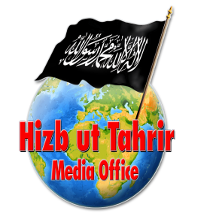Media Office
Wilayah Afghanistan
| H. 10 Muharram 1447 | No: Afg. 1447 / 01 |
| M. Saturday, 05 July 2025 |
Press Release
Russia’s Recognition of the Afghan Government: A Further Step to Block the Emergence of an Islamic Order in the Region
(Translated)
On Thursday, Russia announced that it had officially accepted the credentials of the new Afghan ambassador, thereby becoming the first country to recognize the Taliban-led government.
The Media Office of Hizb utTahrir / Wilayah Afghanistan views this recognition as part of a broader process through which the current regime will be gradually absorbed into the secular international nation-state system. This system, over time, will distance the regime from the vitally prominent Islamic objective of establishing and carrying the Deen of Allah (swt). Moreover, such recognition could turn Afghanistan into a battleground for competition among regional and global powers.
Since the regime change in Afghanistan, Russia has actively sought to build strong relations with the new authorities. This political shift stems from Russia’s national security concerns and its strategic interests in Central Asia. Moscow fears the rise of political Islam, the re-establishment of the Khilafah, and the unification of the Ummah. It expects the current Afghan regime to suppress the Mujahideen in Central Asia. For this reason, on July 4, 2024, President Putin openly declared: “The Taliban are certainly our allies in the fight against terrorism.” Such a statement clearly reveals Russia’s manipulative and instrumental view of the Afghan government.
Recognition, in today’s terms, is a modern political tool used to serve the national interests of powerful states. It is a political favor that Russia has granted based solely on its own strategic calculations—and it expects the Afghan government to pursue and maintain this favor by prioritizing material interests alone, abandoning all other standards, including Islamic values and principles. As the U.S. President Donald Trump made similar expectations from the new Syrian regime. Such common concerns among non-Islamic states show their shared strategy: containing political Islam and preventing the rise of an Islamic order in the region.
Furthermore, the desire to gain such political favor from hostile states like Russia is not rooted in Islamic belief, but rather in a mindset shaped by pragmatism and profit-oriented views. Similarly, Amanullah Khan sent an official letter to Vladimir Lenin, seeking political support from the Soviet Union, which became the first state to recognize his rule. Yet historically—and even now under Vladimir Putin—Russia remains one of the most determined enemies of Islam and Muslims and a major obstacle to the unity of the Islamic Ummah. Its crimes against Muslims in Russia, Central Asia, the Caucasus, Syria, Afghanistan, and other regions are undeniable.
Unquestionably, diplomatic, political, and economic relations with infidel states must be in accordance with what Islam recognizes, and this has historical precedents. From the time of the Prophet Mohammad (PBUH) through the era of the Rightly Guided Caliphs and beyond, Muslims’ foreign relations were always guided by Islamic belief and the principle of al-walāʾ wal-barāʾ. TheKhilafah’s foreign policy used to serve the mission of spreading Islam through Dawah and Jihad in order to expand Islamic governance. One clear example is the Prophet’s (saw) dispatch of emissaries to the palaces of the then emperors.
Diplomacy in Islam is based on principles such as iẓhār-u-dīn, al-walāʾ wal-barā, and the classification of lands as Dār ul-Islām or Dār ul-Kufr. These concepts have no place in the secular nation-state order; in fact, they are often treated as a danger. The current regime can only pursue an Islamic foreign policy and diplomacy if it aims to establish a political order rooted in Islam itself—not one integrated into the secular system. This is only possible through the re-establishment of the second Khilafah Rashidah (Rightly Guided Caliphate) State. Otherwise, the current state will gradually drift into deviation, driven by political realism and entanglement in the secular global order.
Unfortunately, this is the very political misguidance that other rulers in the Muslim world have walked into—and continue to walk in today—leading to their hands being tied by the constraints of the international system.
[ٱلَّذِينَ يَتَّخِذُونَ ٱلۡكَٰفِرِينَ أَوۡلِيَآءَ مِن دُونِ ٱلۡمُؤۡمِنِينَۚ أَيَبۡتَغُونَ عِندَهُمُ ٱلۡعِزَّةَ فَإِنَّ ٱلۡعِزَّةَ لِلَّهِ جَمِيعًا]
“Those who take disbelievers as allies instead of the believers. Do they seek with them honor [through power]? But indeed, honor belongs to Allah entirely.” [An-Nisa' 4:139]
Media Office of Hizb ut Tahrir in Wilayah Afghanistan
| Hizb-ut Tahrir: Media office Wilayah Afghanistan |
Address & Website Tel: http://hizb-afghanistan.org/ |
E-Mail: info@hizb-afghanistan.org |





